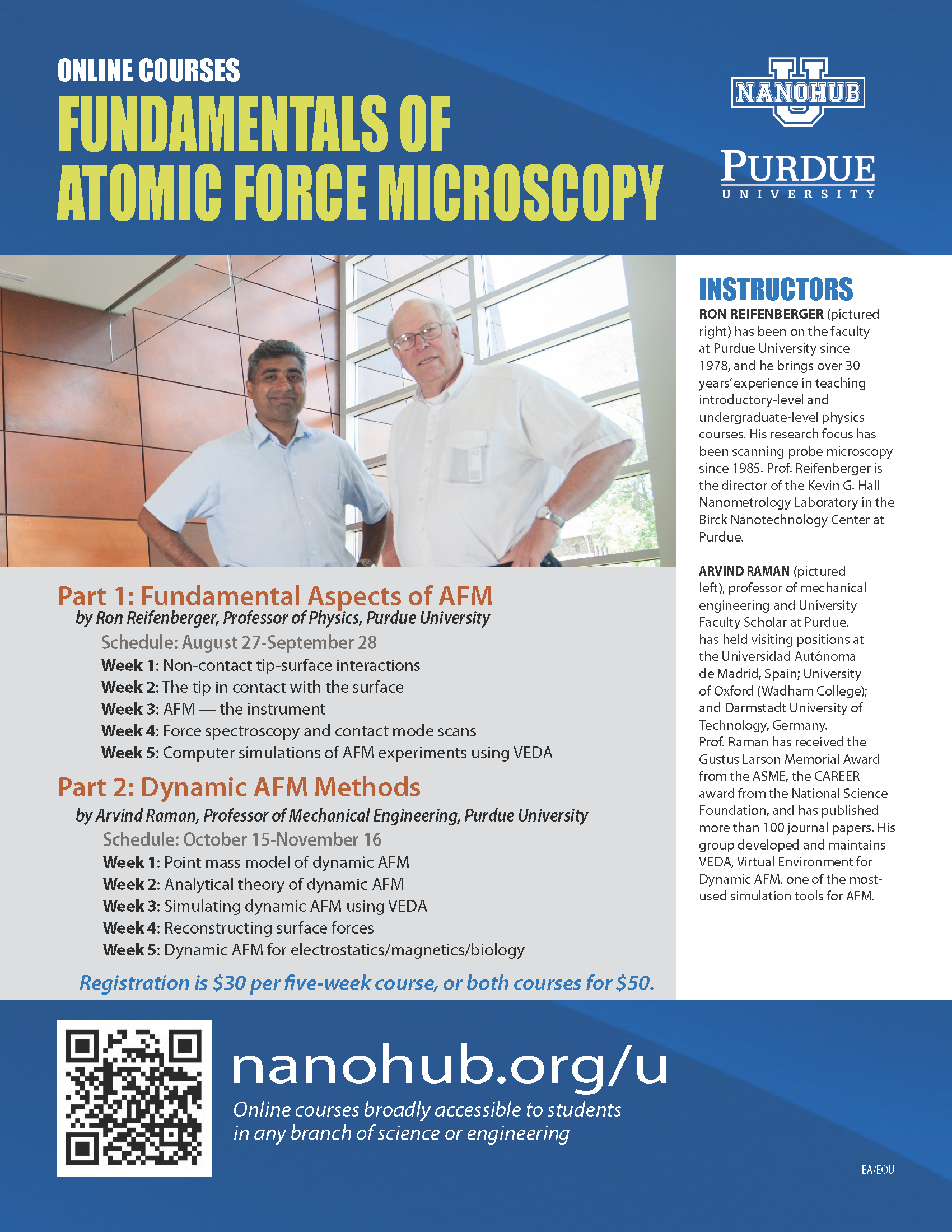FOR INSTRUCTORS
The nanoHUB-U online course initiative was developed to enable students to study a subject in a 5-week framework roughly equivalent to a 1.0 credit class. No credit is given – quizzes and exams are simple and are intended to be aids to learning rather than rigorous tests for acquired skills. In the spirit of a research university, nanoHUB-U courses aim to bring new advances and understanding from research into the curriculum. Every effort is made to present courses in a way that is accessible to beginning graduate students with a variety of different backgrounds. What this means in practice is that the number of prerequisites should be kept to an absolute minimum. The ideal nanoHUB-U course is accessible to any students with an undergraduate degree in engineering or the physical sciences.
Each nanoHUB-U course is different, and some experimentation with different course formats and presentation technologies is encouraged (but please discuss well in advance with the nanoHUB-U staff). We have found, however, that the following format works well.
To assist you in planning and preparing a nanoHUB-U course, a monthly breakdown of the tasks necessary to prepare for a course is listed below. A team of nanoHUB-U course professionals is available to assist with these activities.
In addition, a sample nanoHUB-U course has been set up to provide examples from past nanoHUB-U courses.
| Week 1 | Describing quantum systems: Atoms, solids and nanostructures | Posted |
LecturesM1.1: Describing Quantum Systems - Schrodinger Equation (Datta)M1.2: Describing Quantum Systems - From Differential to Matrix Equation (Datta)M1.3: Describing Quantum Systems - Dispersion Relation (Datta)L1.4: Tip-Surface Interactions (Non-Contact) - InterMolecular Interactions: Ion-Dipoles (Reifenberger)L1.5: Tip-Surface Interactions (Non-Contact) - InterMolecular Interactions: Keesom Force (Reifenberger)L1.6: Tip-Surface Interactions (Non-Contact) - InterMolecular Interactions: Dispersion Force (Reifenberger)Lecture Notes
Errata to the World Scientific Notes can be found here (Datta) DiscussHomework
Problem 1 tutorialProblem 2 tutorialProblem 3 tutorialProblem 4 tutorialExam
The exam will be open from Friday 03/23/2012 12:01am EDT to 04/08/2012 11:59pm EDT. Your results and the solutions will be available after 04/08/2012 11:59pm EDT by clicking on the exam link above. For more details, see the Course Exam Policies on the FAQ Page |
||
nanoHUB-U Course Implementation Outline:
| In brief, each week contains: | ||
6 lectures
Experience shows that lectures should never be more than 30 minutes long. The last week may concentrate more on reviewing materials and answering questions that have arisen rather than on presenting new material. 6 Quizzes (one following each lecture)
Online forum
A weekly homework assignment with written solutions and tutorials.
An exam to test knowledge/participation each week.
|
||
| 6 months | Initial Preparation | |
A different ExperienceTeaching a course for nanoHUB-U is a different experience than teaching a semester long lecture course and a majority of the material to be covered in the nanoHUB-U course should already be available and organized in first draft form ~ 6 months in advance. It is helpful if you can tape a “pilot”, 20 minute lecture well in advance to learn what adaptations might help make your teaching style more effective for the the nanoHub-U format. Powerpoint template, bullets for what needs to be in each video (discussion, etc) |
||
| 4 months | Marketing flyer | |
| 3 months | Complete course information page | |
Complete course information pageCourse objectivesCourse prerequisitesDescription of who should take the courseReview of standard syllabus for course specific changesReview of standard FAQ page for course specific changesplease update to reflect your course , this is an example from a previous course, please paste in your info…Overview videoScientific overview of what students will learn in the courseCourse logistics overview (If non-standard)Define marketing opportunitiesProfessional colleagues e-mail listsCorporate contactsJournal, magazines, etcLecture videosPlan the 6 20 minute weekly lecturesRecord lectures (allow 1 hour per lecture)Record the homework tutorials (4 per week) |
||
| 2 months | Other course content | |
Other course contentQuizzes (2-3 questions per lecture, 6 per week)Homework (4 problems per week)Exams (one per week of content, with 10 questions)Lecture note or Powerpoint slide handoutsPersonal marketingsend e-mails with flyers attached to contacts |
||
| 1 month | Review | |
Reviewall uploaded content reviewed by instructor or TA |
||
| Start of class | Monitor Course page | |
MonitorOnline discussion forum should be monitored daily for comments and questions.Tech supportIssues should be reported to nanoHUB via online support tickets – not by e-mail to instructor. |
||
Additional Information
View the Overview Video (YouTube)Download the Overview Video (mp4)
Coming next year: An open-access educational platform where you can create and administer your own online or on-campus course using nanoHUB and other resources. More information on this new platform will be available soon.

